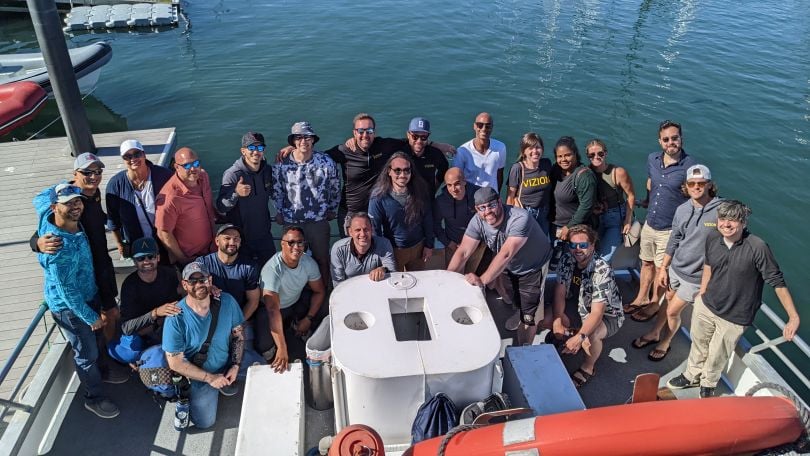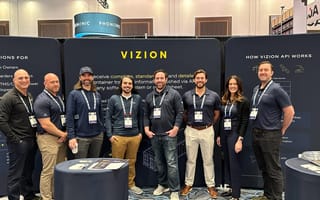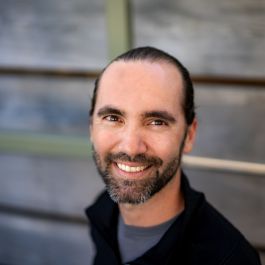Vizion was founded not only on a big idea about logistics, but through the hard-earned instruction of past experiences.
For instance, Vizion CEO Kyle Henderson’s first attempt to innovate the international logistics industry slammed into roadblocks — not because of a lack of skill, resources or vision, but because of bad data.
“I had the good fortune of working at a well-funded startup trying to change how international freight was executed and optimized,” he explained. “Even though we had a team of experienced Silicon Valley talent, we were foiled again and again in delivering next generation software due to data access and data quality.”
To make innovation possible in the freight industry, Henderson needed to address that root problem. Data is a foundational layer for change — if it’s not solid, it becomes a nigh-impossible task to improve the processes built on top.
“We saw armies of people begrudgingly doing manual work to gather information on the progress of their shipments and health of their supply chain, and software that failed to deliver on its promises being sold across the industry,” he said. “Vizion was created to change that. Our company exists to make it easier for anyone to build better software for international logistics.”
“If I’ve learned anything about the supply chain space so far, it’s that even the smallest things can have outsized impacts.”
Joining Henderson on his quest was Tyler Hughes, a friend and colleague from a decade past. Hughes was eager to use knowledge from his wealth of experience in a variety of industries — including user experience, satellite imaging, neuroscience and liquified natural gas technology — to help modernize freight logistics.
What They Do:
Vizion uses an API-based system to automatically provide tracking and shipping data to spreadsheets and software.
“Throughout my career, I’ve found myself most fulfilled when I’m working to apply technical solutions to real-world, often under-served problem areas,” said Hughes. “After spending time working in this space and becoming engrossed with supply chains, I could see a serious lack of data accessibility — something I took for granted as a developer in other spaces.”
Henderson and Hughes’ experience as Vizion’s co-founders and leaders has not been easy: There were challenges, risks and moments where they felt like giving up. But they knew they could change the industry with their solution.
“If I’ve learned anything about the supply chain space so far,” said Hughes, “it’s that even the smallest things can have outsized impacts.” And that impact is what makes all the effort and hardship worthwhile for these two co-founders seeking to change the logistics industry for good.

What scared you the most during your first few years as a founder?
Co-founder and CEO Kyle Henderson: The honest answer is the risk. Tyler and I put a lot of our own time and resources into building a solution and anticipation of good market timing — but timing is one of the few things you can never control. We stood to lose a lot if our timing was wrong, but we believed in what we saw and learned from our time in the industry trying to build better software, and we tried to protect ourselves by being very conscious of how fast we moved and very intentionally not outpacing the industry.
Co-founder and CTO Tyler Hughes: Starting a company is a big bet — on your idea, but also on yourself and your team. This can be scary, especially when everything else still needs figuring out. We knew what was needed and were convinced that the market was there — but with any early product, finding market fit is crucial to determining your longevity. For me this was countered by metered iteration and lots of early feedback to make sure we weren’t just building for ourselves.
When you felt like giving up, what pushed you to keep going?
Henderson: There are multiple moments we talked about giving up — whether that was being rejected by Ycombinator or being frustrated by early users with wildly different needs. Some moments were simply because we couldn’t afford to keep going from a financial perspective. But we always found a way to scrape something together and prove with data the market opportunity and product fit to ourselves before we went to market seeking investors, partners and customers.
“Given how convinced we both were that what we were building was going to be necessary for innovation to happen, it was next to impossible to give up — we just tried even harder.”
Hughes: Bootstrapping is hard. Folks will tell you this, but it is harder than they can make you understand. There were definitely moments where we questioned whether the investment we were making and the opportunities we were forgoing were both truly worth it — usually when cash was tight or morale was low. Given how convinced we both were that what we were building was going to be necessary for innovation to happen, though, it was next to impossible to give up — we just tried even harder.
What’s next?
Henderson: The next thing for Vizion is taking our product to the whole world. That means taking our tracking product out to new geographies and customer bases, as well as developing our next generation of products focused on analytics and optimization. There’s a long list of to-dos across this industry to help it evolve and mature into its data-driven future — Vizion intends to be a driving force in building that reality.







